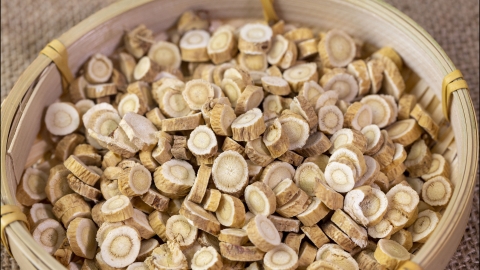What are the benefits of drinking water infused with Huang Qi (Astragalus) and Mai Dong (Ophiopogon)?
Generally, Astragalus (Huangqi) and Ophiopogon (Maidong) are commonly used traditional Chinese herbs. When combined and brewed as a tea, their primary effects include replenishing Qi and nourishing Yin, promoting body fluid production to relieve thirst, moistening the lungs to alleviate cough, enhancing physical strength, and improving spleen and stomach functions. This combination is suitable for individuals with Qi-Yin deficiency for routine regulation, but attention should be paid to the appropriate indications. Specific effects are as follows:

1. Replenishing Qi and Nourishing Yin: Astragalus is slightly warm in nature and functions to replenish Qi, raise Yang energy, strengthen the defensive system, and benefit Qi. Ophiopogon is slightly cold in nature and can nourish Yin, promote body fluid production, clear the heart, and moisten the lungs. When used together, they balance each other's properties and are suitable for individuals with deficiency of both Qi and Yin, who may commonly experience symptoms such as fatigue, shortness of breath, dry mouth, low spirits, and excessive sweating after physical activity. By combining Qi replenishment with Yin nourishment, this herbal combination helps improve the body's weakened state and maintain balance of Qi, blood, and body fluids.
2. Promoting Body Fluid Production and Relieving Thirst: Ophiopogon is particularly effective in nourishing body fluids, while Astragalus promotes the circulation of body fluids. When brewed as a tea, this combination can help relieve discomfort caused by insufficient body fluids, such as dry mouth and throat, sore throat, and hoarseness. It is especially suitable for individuals during dry seasons, those who frequently strain their voice, or those whose body fluids have been depleted following a fever-related illness. It helps maintain moisture in the mouth and throat and alleviates dryness.
3. Moistening the Lungs and Alleviating Cough: Ophiopogon can moisten the lungs, clear the heart, and relieve lung dryness, while Astragalus replenishes lung Qi and enhances lung function. Together, they are suitable for individuals with both lung Qi deficiency and lung dryness, who may experience symptoms such as dry cough with little phlegm, sticky phlegm, and prolonged cough. By nourishing lung Yin and supplementing lung Qi, this combination helps alleviate pulmonary discomfort, gradually relieve cough symptoms, and improve respiratory comfort.
4. Enhancing Physical Strength: Astragalus replenishes the body's vital energy and improves physical weakness and fatigue caused by Qi deficiency. Ophiopogon provides nourishment through body fluid production, preventing fatigue caused by concurrent body fluid deficiency. When brewed as a tea, this combination is suitable for people with high daily physical consumption and those prone to fatigue, helping to restore energy, enhance vitality during daily activities, and reduce feelings of weakness.
5. Improving Spleen and Stomach Function: Astragalus strengthens the spleen, benefits Qi, and enhances the transformation and transportation functions of the spleen and stomach, while Ophiopogon nourishes stomach fluids and alleviates stomach Yin deficiency. This combination is suitable for individuals with deficiency of both Qi and Yin in the spleen and stomach, who may commonly experience symptoms such as poor appetite, mild epigastric pain, post-meal bloating, and dry heaving. By regulating the Qi mechanism of the spleen and stomach and nourishing stomach Yin, it helps restore digestive function, improve appetite, and reduce gastric discomfort.
It should be noted that this tea should not be consumed by individuals with internal excess heat or damp-heat conditions. Long-term or excessive consumption should be avoided to ensure the safety and appropriateness of the regulation.




